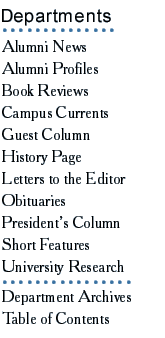

|
 Cover photo by Peter Randall '63 
|
A Taste of Italy
For the young Esposito, Italian cooking meant bone-tiring work. "I remember making 20 loaves of bread on the hottest day of the year," Esposito says. "We were feeding every Tom, Dick and Harry. Always there were chores. We canned mountains of fruits and vegetables. I was roped into rolling out dough or skinning tomatoes or peeling vegetables." Esposito thought she'd left cooking behind when she went off to college. "I wanted to be a teacher," she says. "I really haven't moved from that profession, but now I have 1.2 million students." Her journey from elementary schoolteacher to cooking-show host began in 1979, when her mother sent her a pasta machine. She discovered she remembered how to make the pasta dough and how to dry it by hanging the noodles on broom handles propped on chairs. In 1980, she and her surgeon husband, Guy, took their first trip to Italy. "We'd never met Guy's cousins," she says, "so we went to see them, and I enrolled in a cooking class." As the days went by, "I realized most of what he was showing us I'd seen done at home a thousand times. I'd rolled and cut the dough so many times myself. I even thought his lasagna sheets were too thick!" Soon Esposito was reading about the history of food in each of Italy's 23 regions, traveling there twice a year to study cooking and taking Italian lessons at the University of New Hampshire. In 1985, she enrolled in the master's program in history. On one trip to Bologna, she discovered a 14th-century manuscript, "Libro de la Cocina del Secolo XIV," which translates as "a book of cooking from the 14th century." It became the basis for her thesis. "I used it to answer questions about society at the time. I took some of the recipes and tried to duplicate them. I'd bring in samples for Dr. (Donald) Wilcox to eat. Some of them were god-awful!" This upper-class household ate game and fowl, some pasta, soups -- all seasoned with expensive spices from Africa -- saffron, pepper, cinnamon and cloves, used in abundance to demonstrate the household's wealth. "They were over spiced for modern tastes, but cooking hasn't really changed that much," Esposito says. "Although the doctors warned against eating pears!" Many of the recipes came in response to sumptuary, or dietary, restrictions imposed by the popes. To curb displays of ostentatious wealth during parties that could last six days, Pope Julius limited the number of courses to three. The torta or "great" pie enabled upper-class families to evade those restrictions by layering different foods and encasing them in pastry. The longest recipe in the book was for a parmesan torta; it called for four kinds of meat, onions, parsley, dates, almonds, flour, cheese, eggs, sugar and spices. "I bring a lot of my interest in history to the show," Esposito says. When demonstrating a recipe for penne with pistachio nuts and parmesan cheese, Esposito might tell viewers that parmesan cheese has been around for at least 650 years. "We know that because in Giovanni Boccaccio's Decameron, there's a story about a place called Bengodi, where all the citizens did was grate parmesan cheese." Boccacio began writing The Decameron in 1348. The stories from history and from her life help explain the connection viewers feel to Esposito. "She makes you feel you're in the kitchen with a friend; the real person comes through," Fenneman says.
9 Edgewood Road Durham NH 03824 (603) 862-2040 alumni@unh.edu |